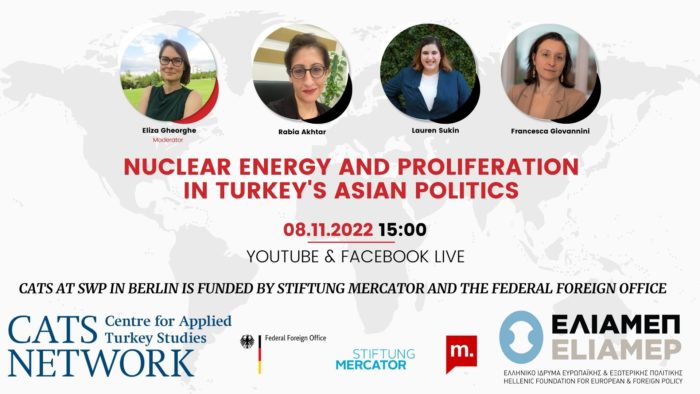Nuclear energy has increasingly featured as one of the solutions for the worsening climate crisis. Approximately 30 countries are contemplating, negotiating, or already setting up nuclear power programs, with 80% of them being developing economies. Turkey is expected to join the group of countries producing nuclear power in 2023, when the Akkuyu Nuclear Power Plant, supplied by Russia, will become operational. Unfortunately, the expansion of commercial nuclear power can enhance nuclear proliferation because countries can pursue atomic weapons under the guise of civilian power programs. Examples of proliferants that followed this dual path abound, triggering fears that newcomers will attempt a similar feat. This webinar explores attitudes about nuclear power and nuclear weapons in Turkey, as well as recent developments in the realms of nuclear energy and proliferation from the Persian Gulf to South Asia and their impact on Ankara’s own policies. We also examine the role of the nonproliferation regime, its effectiveness, and possible solutions for strengthening its appeal and enforcement mechanisms.
Participants
Rabia Akhtar is the founding Director of the Centre for Security, Strategy and Policy Research, University of Lahore. She is also the founding Director of the School of Integrated Social Sciences at University of Lahore, Pakistan. She holds a PhD in Security Studies from Kansas State University. She is a Fulbright alumna (2010-2015). Dr. Akhtar received her Masters in International Relations from Quaid-i-Azam University, Islamabad and her Masters in Political Science from Eastern Illinois University, USA. She has written extensively on South Asian nuclear security and deterrence dynamics. She is the author of a book titled ‘The Blind Eye: U.S. Non-proliferation Policy Towards Pakistan from Ford to Clinton’. Dr. Akhtar is also the Editor of Pakistan Politico, Pakistan’s first strategic and foreign affairs magazine. Dr. Akhtar was a member of Prime Minister Imran Khan’s Advisory Council on Foreign Affairs from 2018-2022. Dr. Akhtar is a Nonresident Senior Fellow at the South Asia Center, Atlantic Council, Washington DC.
Francesca Giovannini is the Executive Director of the Project on Managing the Atom at the Harvard Kennedy School’s Belfer Center for Science & International Affairs. In addition, she is an Adjunct Associate Professor at the Fletcher School of Law and Diplomacy at Tufts University. With a Doctorate from the University of Oxford and two masters’ from the University of California, Berkeley, Dr. Giovannini began her career working for international organizations and the Italian Ministry of Foreign Affairs. She led humanitarian and development projects targeting refugees and internally displaced people in Lebanon, Turkey, and the Palestinian Territories. She also worked as a consultant for the United Nations Crisis Prevention and Recovery Network, drafting regional and national strategies to set-up political violence early warning systems in the Levant and in the South-Pacific. Dr. Giovannini served as Strategy and Policy Officer to the Executive Secretary of the Comprehensive Nuclear Test Ban Treaty Organization (CTBTO), based in Vienna, and as Director of the Research Program on Global Security and International Affairs at the American Academy of Arts and Sciences in Boston.
Lauren Sukin is an Assistant Professor of International Relations and a Centre Affiliate at the LSE Phelan US Centre. Lauren’s research examines issues of international security, focusing particularly on nuclear weapons and alliance politics. Her book project argues that credible nuclear guarantees can create fears of reliance on nuclear allies, leading to support within client states for stronger and more independent military capabilities. Her broader research agenda also explores the dynamics of crisis politics, cyber security, public opinion, security challenges on the Korean Peninsula, and international conflict. Lauren holds a PhD and MA from the Department of Political Science at Stanford University as well as BAs in Political Science and Literary Arts from Brown University.
Moderator:
Eliza Gheorghe, Non-Resident Scholar, Turkey Programme, ELIAMEP
Watch the discussion here.
Watch the 30-minute version with Greek subtitles here.




